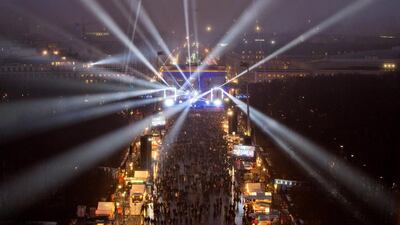Love it or hate it, everyone knows London, or has a strong image of what they believe it is like.
But what is Berlin? What does it offer the worker, the business owner, the investor, the start-up? And what does Berlin have that London does not? What would convince an entrepreneur to set up shop there, or to eschew the West End for life in the Berliner Mitte?
First things first. Last year’s Brexit vote has not, to the surprise of some, led to an outpouring of talent from the UK capital. A number of German cities, including Berlin, led aggressive and concerted attempts to convince engineering talent and young start-ups to relocate to Berlin – with modest success.
Berlin Partner for Business and Technology, a lobby group responsible for marketing the German capital to the world, tipped the city to be the biggest beneficiary of Brexit. “Berlin will become the preferred location” of any firm relocating out of London, its chief executive Stefan Franzke said in the wake of the vote. Yet so far, just five smallish tech start-ups have swapped London for Berlin, reckons Christin Berges, a spokesman for the group.
This does not mean Brexit will not, in the longer term, influence where firms set up shop, or where investors put their money to work. “Much will depend on whether Britain opts for a 'hard' or a 'soft' Brexit,” says Peter Barkow, the founder and managing director of the Düsseldorf-based Barkow Consulting. “If the UK makes the wrong decision, you could see a shift of capital toward the continent, as some start-ups start to see London as a gateway to Britain, rather than a doorway to the continent.” In that scenario, London’s loss could well be Berlin’s gain.
It is worth remembering that these are inherently very different places. Yes, both are filled with talented and ambitious young minds determined to build a life for themselves.
But where London is rigid and uptight, Berlin is sexy and chilled out. There is space to breathe in a city that is 50 per cent larger than London, but with half its population. London is a genuinely global city, but one that is highly Anglophone, while Berlin, notes Alice Thwaite, the founder and editor of the The Echo Chamber Club, a local news service published in English, tends to look east, a city alive with accents from central Asia and eastern Europe.
Over the past decade, the German capital has become a genuine cultural melting pot. “We employ people from more than 40 nationalities working in marketing, engineering and sales,” notes Christian Hillemeyer, the head of communication at Babbel, a Berlin-based online language specialist. “I have friends who have been here for 10 years, but speak no German.”
Where the two cities really differ, though, is in terms of cost and brand. “For anyone looking to bootstrap a tiny business, Berlin is a great option,” says Ms Thwaite. “It’s one of Europe’s cheapest capital cities,” with 25 square metre rooms available in the heart of the city for £350 [Dh1,673] a month.
She believes the greatest threat to London’s long-term viability stems not from Brexit, but from the “incredible cost of living” in the UK capital. Ms Hillemeyer adds: “We are located in a very big office building in central Berlin. Imagine the cost of doing that with 500 people in London? For us, it just would not work.” Rents are, however, rising fast in Berlin, begging the question of how much longer it will remain such a desirably cheap city.
Brand, that most nebulous of input factors, is quite another issue. Berlin is a fabulous place to visit. But when the world arrives in Europe on business, invariably its first port of call is London. It is a city that genuinely “has it all – money, start-up capital, technology firms, infrastructure, proximity to financial institutions,” notes Mr Barkow. “The latter, in particular, is something Berlin does not have.”
Ms Thwaite spotted the difference between Berlin and London shortly after moving to the German capital. “The big seed investors are in London, as are the journalists I work with. And I’m asked to speak at London’s many international conferences, which is why I now divide my time evenly between the two cities.
"In my view, the whole thing about Brexit being bad for business and bad for London is slightly overplayed. Berlin is a great city, but London is full of people you need to meet to do business.”

